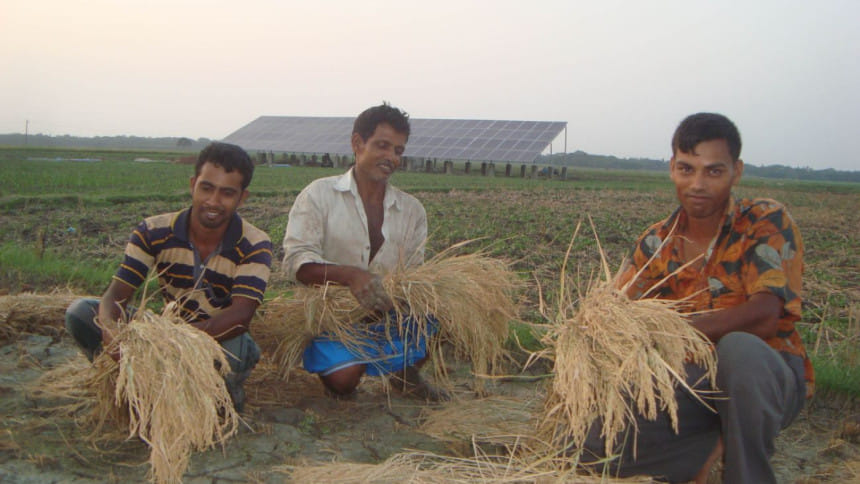Solar pump brings better life to Jhenidah farmers

The paddy farmers of Hardebpur village in Jhenidah's Kaliganj upazila have reason to be upbeat. They have benefited from the installation of a solar driven irrigation system that has proved its potential to provide water to the field at low cost. Hardebpur's farmers anticipate a bumper crop with maximised profits, enough to make any farmer smile.
"I never imagined we could achieve such a good yield with a solar pump," says one farmer Alok Biswas. "The generous water supply made available by the pump means this year's Boro crop will be a good one."
"The solar system means we can grow three paddy crops, IRRI, Boro and Robi, at lower cost," says another farmer Arun Biswas. "We no longer need additional electricity and it's much cheaper than running a standard pump engine."
The innovative project funded by the Bangladesh government established Infrastructure Development Company Limited and implemented by NGO Action in Development involved the installation of two solar irrigation pumps at deep tube wells beside a local waterway, Hardebpur Garar Beel, in 2014, with a further five pumps added in December last year.
Currently 250 farmers are benefiting from the project. In the Boro season each pays irrigation fees in three instalments: Tk. 1,000 at the start of the season; another Tk. 1,000 before harvest; and Tk. 3,000 once harvest has been completed. For Aman and Robi crops the rates are even cheaper: Tk. 1,400 for the former and only Tk. 600 for the latter.
According to project coordinator Md. Hasanuzzaman Babu, the project represents the realisation of a long held dream. With the goal of establishing solar irrigation, the local farmers' association was established in 2009 and continues to work towards expanding solar irrigation availability in the area.
"The solar pumps offer low cost water in comparison to traditional irrigation methods," says Babu, "and of course being off-the-grid there's no load shedding."
Thus far the project has required inputs of 81 solar panels with work including well boring, pump house and base construction as well as cabling. Each panel can produce 230 watts of electricity for a total of 18.5 kilowatts total for the current infrastructure. This translates into 14 lakh litres of water per day provided to farmland.
The success of the project has already attracted the attention of neighbouring areas. Abul Hossain Biswas of nearby Dudrajpur village for example told The Daily Star that efforts are on to have a solar electricity mini-grid installed in his village too.
"The solar pump is a good initiative," says Shah Akramul Haque, deputy director of Jhenidah's agriculture extension department. "It's cost effective and truly benefits our farmers."

 For all latest news, follow The Daily Star's Google News channel.
For all latest news, follow The Daily Star's Google News channel. 



Comments